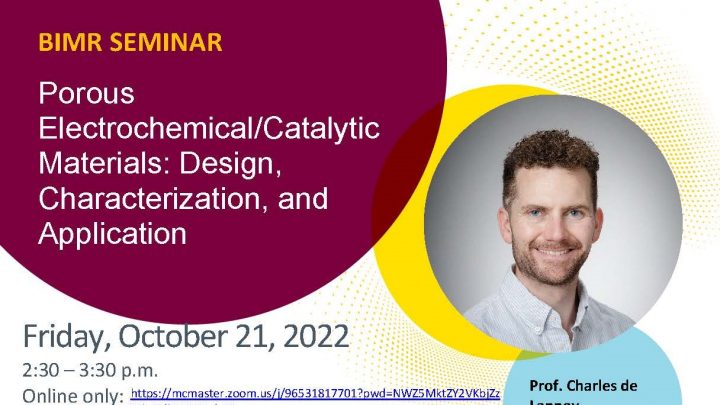Porous Electrochemical/Catalytic Materials: Design, Characterization, and Application
Oct 21, 2022
2:30PM to 3:30PM

Date/Time
Date(s) - 21/10/2022
2:30 pm - 3:30 pm
Categories
Prof. Charles de Lannoy
Department of Chemical Engineering
McMaster University
Abstract:
Catalysis and electrocatalysis have transformed many industrial processes from pharmaceutical manufacturing to polymer synthesis to hydrogen production. Catalytic processes are batch reactions that require post-reaction filtration, and form one of many sequential separation steps. However, batch processes are less efficient than the theoretical continuous process equivalents, expensive catalysts undergo attrition and deactivation due to their frequent collisions in batches, and the active catalysts can be lost during filtration of the chemical products. Furthermore, multi-step processes are capital-intensive and thus expensive.
Membrane systems are a continuous flow-through process that are among the most efficient, most cost effective, and safest technologies for separations, but they are passive barriers to solutes and as inert surfaces they do not actively engage in reactions or transformations of solutes. For example, in wastewater treatment, membranes purify the feed by simply concentrating a waste stream without degrading the harmful contaminants, thereby transporting the problem elsewhere. Combining catalysis with membrane separations into a single material configuration offers the possibility of great improvements in catalytic reaction and separation efficiency, eliminating catalyst loss and attrition, and reducing capital costs, while providing the opportunity to expand catalytic reactions to environmental separations continually challenged by an increasing number of contaminants. Yet, one of the major scientific challenges in this nascent field, is how to synthesize effective electrochemical/catalytic membranes (ECMs): materials that are porous yet stable, have well distributed (nano)catalysts that are accessible to the flow, are contiguously electrically conductive, and maintain or enhance both the membrane and the catalyst properties as compared to the separate unit processes.
Prof. de Lannoy and his research lab have pioneered the development of electrochemical and electrocatalytic membranes for environmental remediation among other applications. This talk will present details of preliminary electrochemical membranes (ECMs): the synthesis, characterization, and application of polymeric membranes seeded and/or coated with metal catalysts. Three specific configurations will be discussed including catalytic membranes composed of ultrafiltration polyethersulfone (PES) membranes decorated with Ni-Cu bimetallic catalysts, electrochemical PES membranes coated with carbon nanotubes (CNTs) containing nano-zero valent iron nanoparticles, and electrocatalytic PES membranes coated with Ni-P electrocatalysts.
Bio:
Charles-François de Lannoy is an Associate Professor in Chemical Engineering and Adjunct Professor in Chemistry at McMaster University currently leading a team of 10 students (2 PDF, 5 PhD students, 2 MSc students, and 1 undergraduate student researcher). His research focuses on environmental remediation using advanced separations. His lab is broadly categorized into three main themes: 1) nanomaterials and separations processes for environmental remediation and resource recovery, 2) co-created water research with First Nations communities, and 3) aerosol separation technologies.
He has published over 50 peer-reviewed publications in top journals in his field, he holds 4 patents, and has given 40 talks at international conferences.
Before joining McMaster University, Charles was a visiting scholar in the Energy Materials & Systems Lab at PARC, a Xerox Company working in conjunction with X (Google’s Moonshots Laboratory), on various technologies. Charles completed a Post-Doctoral Research Fellowship in the Department of Energy Resources Engineering in the School of Earth Sciences at Stanford University, and he received his PhD from Duke University in 2014, in Civil and Environmental Engineering, with a Certificate in Nanoscience, under the mentorship of Prof. Mark R. Wiesner.
He is a skier (cross-country and downhill) in the winter, a canoer and back-country camper in the summer, and a runner all the time. Recently, he and his wife and little puppy have moved to the south of France for a year, learning new French activities.
Join Zoom Meeting
https://mcmaster.zoom.us/j/96531817701?pwd=NWZ5MktZY2VKbjZzMkg0dkNaN0Jtdz09
Note: This week the seminar will be online only.

